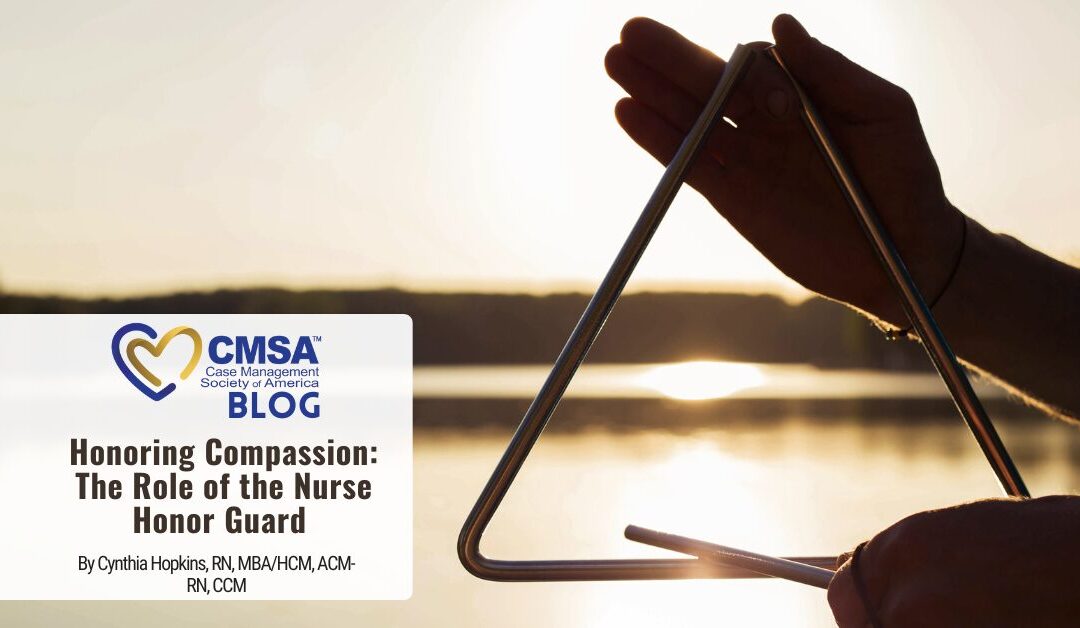By Cynthia Hopkins, RN, MBA/HCM, ACM-RN, CCM
In the quiet moments of hospitals and clinics, nurses are pillars of compassion, skill, and resilience. Their work often goes unnoticed outside the walls of healthcare facilities, but a unique tradition is emerging to honor these unsung heroes: the Nurse Honor Guard.
The Nurse Honor Guard is a dedicated group of volunteer nurses who pay tribute to their colleagues at their time of passing. This solemn and respectful ceremony recognizes nurses' profound contributions throughout their careers, acknowledging their dedication to caring for others, even in the face of personal sacrifice.
Origins and Significance
The concept of the Nurse Honor Guard is believed to have originated in the Midwest United States, spreading gradually across the country as more nursing communities embraced the idea. The tradition draws inspiration from military honor guards, who perform similar services to recognize and honor deceased veterans. However, the Nurse Honor Guard focuses on the specific contributions and sacrifices made by the nurses in their professional lives.
The Ceremony
When a nurse passes away, the Nurse Honor Guard provides a ceremony reflecting the dignity and respect deserved by the departed. The ceremonies can vary in detail, but they generally include several key elements:
- Uniformed Nurses: Volunteers often don traditional nursing uniforms, symbolizing the timeless nature of nursing and its enduring values of care and compassion
- Florence Nightingale Lamp: A symbolic lamp, reminiscent of the one carried by Florence Nightingale, is often part of the ceremony. This lamp represents the light and hope nurses bring to their patients and the nursing profession.
- Reading of the Nightingale Pledge: Similar to the Hippocratic Oath taken by physicians, the Nightingale Pledge is recited to honor the nurse's commitment to ethical and compassionate care
- Moment of Silence: A solemn moment of silence is observed to reflect on the nurse's life and contributions, offering a time for attendees to honor their colleague's memory.
- Presentation of a White Rose: A white rose, symbolizes purity, honor, and remembrance and is often presented to the family of the deceased nurse as a token of respect and condolence
The Impact
The presence of the Nurse Honor Guard at memorial services offers comfort to grieving families, reinforcing the idea that their loved one's contributions were meaningful and appreciated. It also provides a sense of closure for fellow nurses, who see their colleagues honored for their dedication and hard work.
Moreover, the Nurse Honor Guard is a powerful reminder of the noble nature of the nursing profession. It highlights the selflessness and commitment required to care for others, often under challenging and emotionally taxing circumstances. By honoring deceased nurses, the tradition inspires current and future generations to uphold these values and continue the legacy of compassionate care.
Becoming Involved
Nurses who wish to participate in the Nurse Honor Guard can often find local chapters through nursing associations, hospitals, or online communities. Training and resources are typically provided to ensure that volunteers can perform the ceremonies with the utmost respect and professionalism.
The Nurse Honor Guard is a testament to the solidarity and camaraderie within the nursing profession. It is a way for nurses to support one another, even beyond the end of life, and to affirm their profound impact on their patients, families, and the broader community.
Conclusion
In a world where the tireless efforts of nurses can sometimes go unnoticed, the Nurse Honor Guard stands as a beacon of recognition and respect. Through their solemn ceremonies, these dedicated volunteers honor the lives and legacies of their colleagues, ensuring that the light of their compassion continues to shine brightly.
EXCITING NEWS! Our #CMWeek2024 schedule is live, and we’re offering an incredible lineup of education and CEs throughout October! Dive into diverse topics tailored for case managers in all settings, including bonus webinars and ethics CEs. The best part? All education during October is FREE to ALL case managers! Don’t miss out—mark your calendars and get ready to enhance your skills and knowledge: ![]() https://cmsa.org/about/national-cm-week/
https://cmsa.org/about/national-cm-week/
Bio: Cynthia Hopkins RN MBA/HCM ACM-RN CCM is a healthcare leader with over 30 years’ experience. That experience spans into public health, acute care, clinic, and case management. Cynthia possesses a wealth of knowledge in case management, utilization management, and transition of care. She previously served on the Program and Service Committee-task force with CCMC, with the task of item writing, items review for the CCM exam, she also served as Board member with ACMA Houston Chapter and is currently the President, CMSA Houston Chapter. In her free time, she enjoys traveling, gardening, and spending time with her husband and grandchildren.


What a beautiful honor for a LIFE of Service!
Beautifully written! Thank you!
Nurses honoring Nurses. I feel honor to be part of this organization.